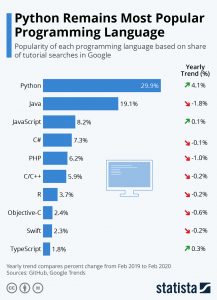
SECTION 1
MODULES IN PYTHON AND THEIR APPLICATIONS
OPERATOR: A Python function that provides a set of pre-defined functions.
DECIMAL: This symbol is used to print the complete decimal values when one number is divided by another.
RANDOM: This module generates random numbers. Some of its pre-defined functions include randint (), choice (), and so on.
STRING: The String module contains a collection of functions that can be used to perform various operations on characters. It includes pre-defined functions such as ascii letters.
Math: modules are used to perform mathematical operations such as sqrt, factorial, and so on.
EXTERNAL MODULES IN PYTHON AND THEIR APPLICATIONS
0S:This library includes functions for creating and removing directories (folders), retrieving their contents, changing and identifying the current directory, and so on.
Matplotlib: This library is responsible for plotting numerical data, such as pie charts, histograms, scatterplots, graphs, and so on.
Pandas: is an open-source machine learning library that offers flexible high-level data structures as well as a number of analysis tools. It facilitates data analysis, manipulation, and cleaning. Pandas supports operations such as sorting, re-indexing, iteration, concatenation, data conversion, visualizations, aggregations, and so on.
Numpy: Numpy is an abbreviation for "Numerical Python." It is the most widely used library. It is a well-known machine learning library that can handle large matrices and multidimensional data. It includes built-in mathematical functions for quick computations.
SEABORN: is a matplotlib-based Python data visualization library. It provides a high-level interface for creating visually appealing and informative statistical graphics.

